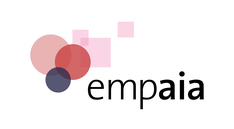EMPAIA - EcosysteM for Pathology diagnostics with AI Assistance
AI for diagnostics
Only through the use of AI in diagnostics are modern treatment procedures such as personalised medicine possible across the board. EMPAIA is therefore using pathology as an example to establish a platform for standardised, certified and explainable AI solutions for image-based medical diagnostics. In addition to an infrastructure for access to training data, a marketplace with AI applications for clinical practice will be created on the platform. In addition, solutions for the legal and billing challenges will be developed.
Market perspective and product promise
EMPAIA is the first platform for the development, marketing and use of AI solutions in pathology. Users can integrate data and AI models into diagnostic processes in a legally secure manner and also bill them correctly. The solutions developed in the project can be easily transferred to other fields, paving the way for the broad application of AI in diagnostics. The EMPAIA platform will be financed, among other things, by user fees for the data sets and AI solutions provided.
Consortium
Charité - Universitätsmedizin Berlin, Fraunhofer-Gesellschaft zur Förderung der angewandten Forschung eingetragener Verein, Technische Universität Berlin, Qualitätssicherungs-Initiative Pathologie QuIP GmbH, Vitasystems GmbH.
Challenge and innovation
Advances in medicine are improving the possibilities and quality of diagnostics. In the future, however, the analyses will no longer be manageable by healthcare professionals due to the mass of data. This challenge can be solved by AI automations, as they can take over many repetitive and tedious analysis tasks. However, in order to develop such AI solutions, data is needed for their training and validation. So far, however, there is no infrastructure for creating and sharing datasets. Those who need medical data or want to share it with others have to negotiate this in a time-consuming way through individual contracts. There are also no efficient solutions yet for the certification of AI applications along the lines of the Medical Devices Act (MPG). The fragmentation of the AI infrastructure and the lack of technical standards inhibit the distribution of AI solutions, which limits the market opportunities of the highly specialised German AI SMEs in particular. In addition, many users in clinics or research institutions currently still distrust AI analyses unless they are fully comprehensible.
Solution approach
EMPAIA is developing a platform that overcomes all current barriers to the development, distribution and use of AI in pathology. The platform enables the development and global application of standardised, certified and explainable AI solutions. It provides an infrastructure for access to data and implements the legal and billing rules. The platform is complemented by an ecosystem for cooperation with bodies. With these, regulations are agreed on the topics of standardisation, economic efficiency and billing, validation and certification, legal issues and AI explainability.
Different types of AI applications will be available on the platform. Users will find all the necessary functions to integrate data and AI into diagnostic processes and to bill them. The applications come mainly from medical device manufacturers, but also from participating universities. They will be permanently developed further, tested in EMPAIA reference centres and validated and certified in cooperation with the partners. A computer network (High Performance Computing Cluster) is offered for the provision (deployment) of cloud-based AI solutions. As a central part of the infrastructure for the efficient exchange of large pathology data sets, an overarching database (data repository) will be implemented.
Use Cases
EMPAIA paves the way for the development of diverse AI tools and methods for clinical application by providing the platform not only with all the data, but also with validation and certification, distribution and billing of the applications.
Development of AI tools for mitosis detection
When diagnosing tissue under the microscope, it is often necessary to determine values that are decisive for the choice of therapy. This includes, for example, the frequency of cell divisions (mitoses). AI applications make these measurements much faster and more reproducible than manual counts.
Development of AI tools for "companion diagnostics"
Due to the increased molecular understanding of the basics of cancer, targeted drugs are being used more and more frequently in oncology. In order to be able to make statements about their effect, accompanying tests ("companion diagnostics") are needed, for example to identify genetic defects or other malfunctions. With the help of AI, the tests can be carried out efficiently and safely.
| Without EMPAIA | With EMPAIA |
|---|---|
| Many doctors do not use AI so far because the implementation of the applications is associated with legal, organisational and technical obstacles; moreover, AI analyses are often not comprehensible. | EMPAIA creates a simple, trustworthy and billable access to AI solutions. For AI explicability, a generic framework is developed that makes the predictions of AI applications comprehensible. |
| Patients do not trust AI and fear wrong diagnoses. | EMPAIA validates the results of the AI solutions. |
| When procuring data, ethical and legal framework conditions must be negotiated individually for each project or application area. | EMPAIA creates a secure legal framework for all AI offerings on the platform and ensures compliance with all data protection regulations. |
| The diversity of systems with heterogeneous interfaces puts small and medium-sized medical technology manufacturers at a particular disadvantage. | EMPAIA is developing a neutral platform that is not tied to a single company but is open to all market participants. In addition, the project provides standardised interfaces and develops reference solutions. |
| Standards and references for the billing of AI services are missing so far. | In a task force, the project is working with the Professional Association of German Pathologists (Berufsverband Deutscher Pathologen e.V.), the KBV and health insurance funds to develop binding billing methods. |
- Recommend this page:
- Print view
